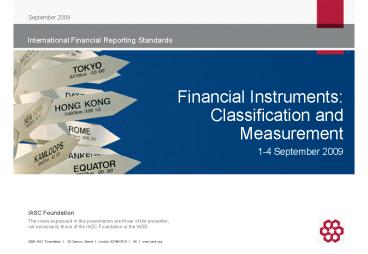Financial Instruments: Classification and Measurement - PowerPoint PPT Presentation
Title:
Financial Instruments: Classification and Measurement
Description:
Generally fully retrospective, but some transition relief will be provided ... FASB FV-OCI presentation approach. Balance sheet ... – PowerPoint PPT presentation
Number of Views:170
Avg rating:3.0/5.0
Title: Financial Instruments: Classification and Measurement
1
Financial Instruments Classification and
Measurement
- 1-4 September 2009
2
TimetableOne project three phases
2
Project phase Exposure Draft Finalisation
1. Classification and Measurement July 2009 In time for 2009 year end financial statements
2. Impairment methodology October 2009 In 2010
3. Hedge accounting December 2009 In 2010
The above is in addition to a project on
derecognition of financial instruments. ED
Derecognition was published in March 2009.
2008 IASC Foundation 30 Cannon Street
London EC4M 6XH UK www.iasb.org
3
Classification and MeasurementOverview of
proposed approach
3
Amortised cost (one impairment method)
FVO for accounting mismatch
No reclassification
Fair Value (no impairment)
- All other instruments
- Equities
- Derivatives
- Some hybrid contracts
Equities OCI presentation available
2009 IASC Foundation 30 Cannon Street
London EC4M 6XH UK www.iasb.org
4
Classification and MeasurementAmortised cost
criterion
- Basic loan features
- Contractual terms that give rise to cash flow
amounts that represent both principle and
interest - Interest represents consideration for
- time value of money
- credit risk
- Managed on a contractual yield basis
- Business model is to manage and evaluate based on
collection or payment of contractual cash flows
generated when holding or issuing the instrument - Not an instrument by instrument approach to
classification
5
Classification and MeasurementOther features of
proposed approach
- Embedded derivatives
- For hybrid contracts with financial hosts gt
Entire hybrid contract assessed using proposed
classification and measurement model - For hybrid contracts with non-financial hosts gt
Existing IAS 39 requirements retained - Fair value option
- Retained to address accounting mismatches
6
Classification and MeasurementOCI presentation
option
6
- Scope investments in equity instruments not
held for trading - Other features
- option available instrument by instrument on
initial recognition - no recycling, impairment or change in
presentation - dividends also recognised in OCI
2008 IASC Foundation 30 Cannon Street
London EC4M 6XH UK www.iasb.org
7
Summary of key changes to IAS 39
IAS 39 Proposed approach
Classification Many categories each with different measurement, presentation and impairment methods Two measurement bases Amortised cost (one impairment method) and Fair Value.
Measurement Many categories each with different measurement, presentation and impairment methods Irrevocable option at initial recognition to present fair value changes of some equity instruments in OCI.
Impairment Different impairment rules depending on category and instrument type Only debt instruments at amortised cost are tested for impairment. One impairment method.
Tainting Tainting rules for held to maturity investments No tainting rules for assets measured using amortised cost.
Reclassification Some reclassifications permitted/required No reclassifications. Business model approach.
Embedded derivatives Bifurcation of embedded derivatives required in some cases No separation. Same classification approach (for hybrids with financial hosts)
FVO Available if specific criteria are met Available for an accounting mismatch
8
Classification and Measurement
8
- Approach proposed for transition
- Generally fully retrospective, but some
transition relief will be provided - Early adopters will be subject to disclosures in
addition to IAS 8 disclosures - Effective date
- Any final proposals will be available for
voluntary application for 2009 year end financial
statements - Mandatory date for adoption not before 1
January 2012 - Comment deadline for exposure draft is 14
September 2009
2008 IASC Foundation 30 Cannon Street
London EC4M 6XH UK www.iasb.org
9
Classification and MeasurementFASB proposed
approach
- All financial instruments within the scope of the
project would be measured on balance sheet at
fair value with changes in net income or other
comprehensive income - Fair value through net income
- Default category. Includes all equity
investments, derivatives hybrid contracts that
require separation. - Fair value through OCI
- Qualify if business strategy is to hold debt
instruments with principle amounts for collection
or payment(s) of contractual cash flows rather
than to sell or settle the financial instruments
with a third party - Current period interest impairment recognised
in PL. - Other changes in fair value recognised in OCI.
- Recycling on derecognition.
10
Classification and MeasurementFASB FV-OCI
presentation approach
- Balance sheet
- present as separate line items in the balance
sheet amortized cost and the necessary adjustment
to arrive at fair value, and cumulative credit
losses. - Income/performance statement
- One statement is mandatory with subtotals for net
income and total comprehensive income. (EPS based
on net income). - Net income to include interest and dividends,
credit impairments, realized gains and losses. - OCI to include entire change in fair value for
qualifying instruments.
11
Classification and MeasurementFASB model other
features
- Amortized cost option
- Limited amortized cost option for certain
financial liabilities (own debt) - Embedded derivatives
- Current bifurcation criteria for hybrid financial
instruments would determine whether those
instruments would be classified in FV-NI category
or could be FV-OCI category. - Clearly closely related could be at FV-OCI
- Not clearly closely related at FV-NI
- Non-financial hybrids would continue to follow
current guidance related to bifurcation
12
Questions or comments?
12
Expressions of individual views by members of
the IASB and its staff are encouraged. The views
expressed in this presentation are those of the
presenter. Official positions of the IASB on
accounting matters are determined only after
extensive due process and deliberation.
2008 IASC Foundation 30 Cannon Street
London EC4M 6XH UK www.iasb.org































